Water-Saving and Drought-Resistant Rice Continues to Drive Agricultural Modernization in Africa
On the morning of September 5, President Xi Jinping attended the opening ceremony of the Beijing Summit of the Forum on China-Africa Cooperation (FOCAC) at the Great Hall of the People in Beijing and delivered a keynote speech titled Jointly Advancing Modernization and Building a Community with a Shared Future. He reviewed the development of China-Africa relations, announced a new positioning for bilateral ties, and proposed ten partnership initiatives to jointly advance modernization.
At the summit, Chinese and African leaders gathered under the theme "Jointly Advancing Modernization and Building a High-Level China-Africa Community with a Shared Future" to strengthen friendship, discuss cooperation, and envision the future. Since the establishment of FOCAC, China has helped Africa build numerous landmark projects and "small yet beautiful" initiatives, significantly improving the well-being of African people. Among these achievements is a technological breakthrough from Shanghai—water-saving and drought-resistant rice.
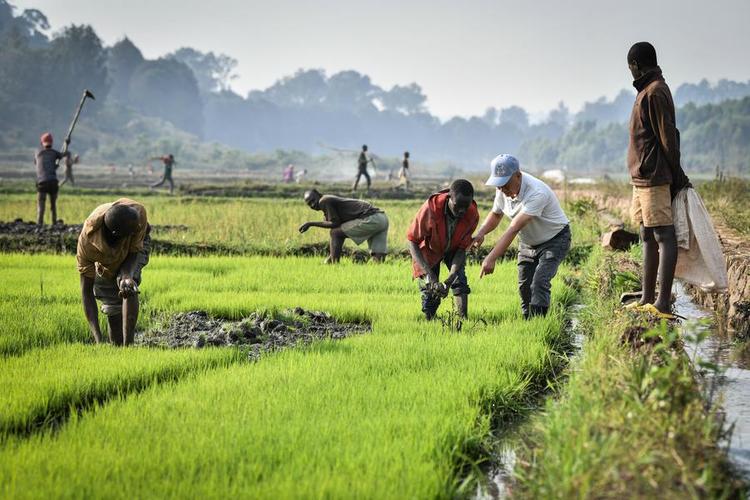
Since 2008, water-saving and drought-resistant rice has undergone selection trials, demonstration planting, and promotion in multiple African countries, including Kenya, Madagascar, Togo, Uganda, Ghana, Angola, Nigeria, and Tanzania. It has been approved as a new variety in several nations, delivering tangible benefits to local communities and offering a replicable "water-saving and drought-resistant rice solution" to help African countries achieve food self-sufficiency, thereby fueling the continent’s agricultural modernization.
Dilemma: The Urgent Need to Ensure Food Security
The 2024 State of Food Security and Nutrition in the World report by the United Nations Food and Agriculture Organization (FAO) highlights that approximately 300 million Africans—about 20.4% of the continent’s population—face food insecurity, with projections indicating that 53% of the world’s hungry will be in Africa by 2030. Rice is a staple food for many African households.
Yet, African nations face a significant gap between rice production and demand, compounded by numerous challenges in boosting yields. Basic farmland and infrastructure remain underdeveloped, making rice cultivation heavily reliant on rainfall. Extreme weather events—such as droughts, pest outbreaks, floods—and natural disasters pose severe threats. Traditional rice varieties have limited potential, are highly dependent on water and fertilizers, and struggle to achieve high yields. Low farming techniques and practices further hinder productivity. Additionally, many countries are constrained by the Ramsar Convention from expanding rice cultivation areas. As a result, African nations often rely on rice imports. Reducing external dependence and increasing domestic production have become critical priorities for Africa’s agricultural modernization.
Breakthrough: Exploring a "Water-saving and Drought-resistant Rice Solution" Suitable for Africa
Water-saving and drought-resistant rice offers a tailored solution to these challenges.
With its inherent advantages in water efficiency and drought resistance, combined with direct-seeding and dryland management techniques, this rice significantly mitigates the impact of adverse weather conditions, substantially boosting local rice yields.
In December 2020, the "Han You 73" hybrid rice variety, introduced through China-Africa cooperation, underwent successful trials at the China-Malawi Agricultural Technology Cooperation Farm near Lilongwe, Malawi’s capital. Over two years, agricultural experts from both countries confirmed its high yield, reaching 9.14 tons per hectare—more than triple the 3 tons per hectare of the local control variety, "Nerica4." A Malawian agriculture official noted that widespread adoption of "Han You 73" alongside reclaiming fallow land could nearly achieve rice self-sufficiency in the country.
In late 2021, comparative trials between water-saving and drought-resistant rice and local varieties in Uganda revealed a 50% higher yield—9.6 tons per hectare compared to 5.97 tons per hectare for local strains.\
The planting schedule of water-saving and drought-resistant rice can align with the rainy season, leveraging seasonal rainfall. In West Africa’s Ghana and Burkina Faso, the crop typically matures in about 120 days when sown during the wet season.
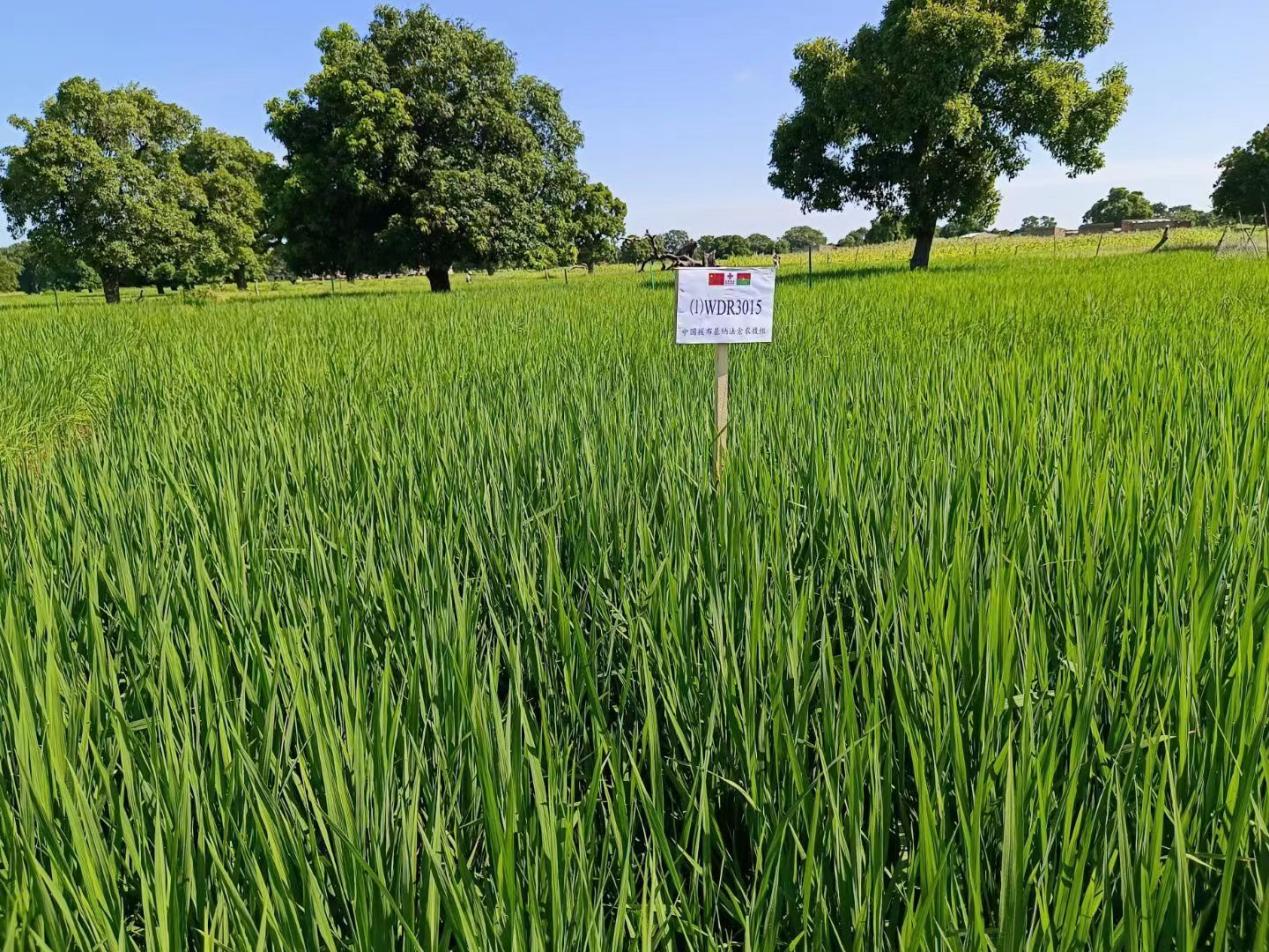
Burkina Faso WDR 3015 (September 2022)
In 2022, the variety was successfully tested in Botswana. That June, Botswana celebrated its "Chinese Rice Harvest Day," where Vice President Tsogwane harvested rice in a trial field, praising its potential to enhance food security, reduce import reliance, and ensure stable supplies.
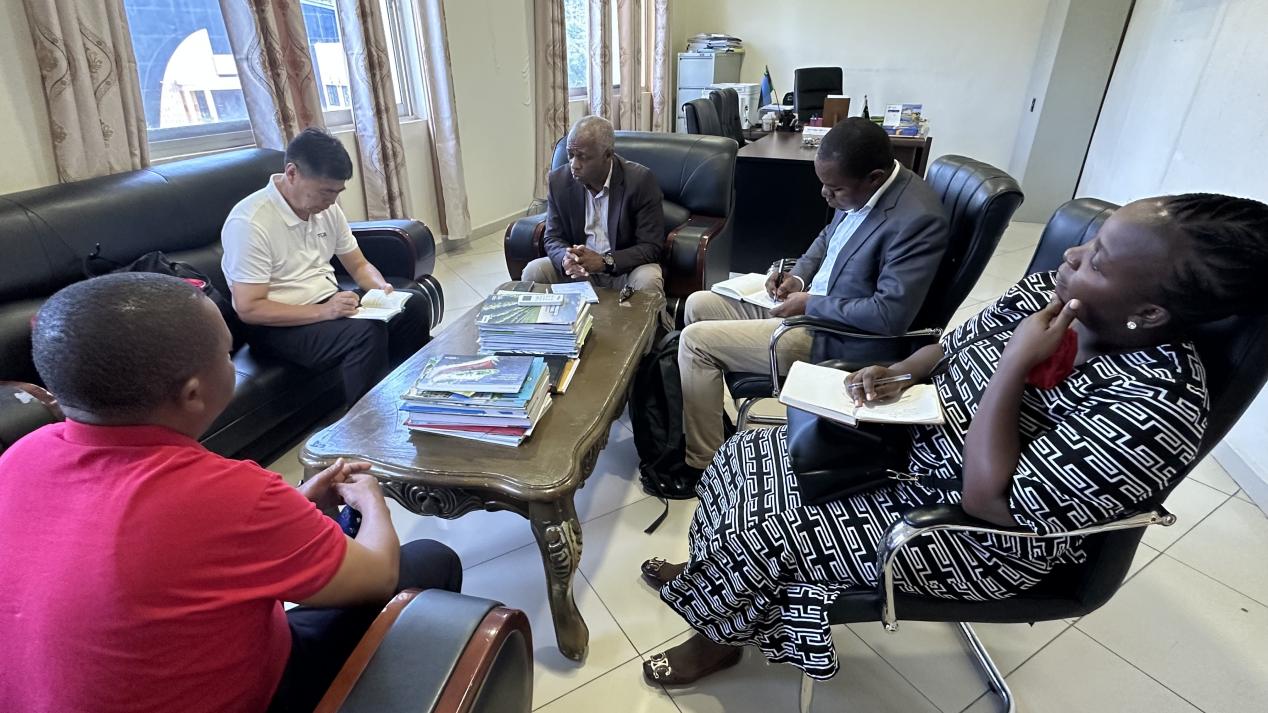
Researchers discuss research cooperation with the Ministry of Agriculture in Zanzibar
In 2024, the Shanghai Agrobiological Gene Center and the Zanzibar Agricultural Research Institute signed a memorandum of understanding on scientific collaboration. The first batch of water-saving and drought-resistant rice was planted in March at a government farm on Zanzibar Island, yielding promising results—shorter growth cycles (10–20 days less) and a 90% seed-setting rate. This success addressed Zanzibar’s lack of high-quality rice varieties, unlocking significant potential for local farmers.
Beyond boosting yields, water-saving and drought-resistant rice contributes to carbon reduction, supporting Africa’s green agricultural transition. Under direct-seeding and dryland management, it reduces water usage by 50% and cuts methane emissions, advancing sustainable farming practices.
Growth: Deepen the foundation of cooperation between China and Africa in water-saving and drought-resistant rice
Under the frameworks of China-Africa cooperation and the Belt and Road Initiative, this Shanghai-developed agricultural innovation is reaching more African nations, safeguarding global food security. From pilot trials to MoUs, from comparative studies to large-scale demonstrations—from local acclaim to international recognition—water-saving and drought-resistant rice continues to thrive in Africa. The Shanghai Agrobiological Gene Center’s partnerships with African countries are deepening, expanding the influence of Chinese agricultural varieties.On October 21, 2020, the United Nations Environment Programme (UNEP) reported on the successful trials of "Han You 73" in Kenya, Uganda, and Ghana, highlighting its role in food security, wetland conservation, and greenhouse gas mitigation. The center subsequently signed agreements with UNEP’s Africa Office, Kenya’s Agricultural & Livestock Research Organization (KALRO), and other institutions to promote the variety’s approval and dissemination, improving farmers’ livelihoods and strengthening food and ecological security.
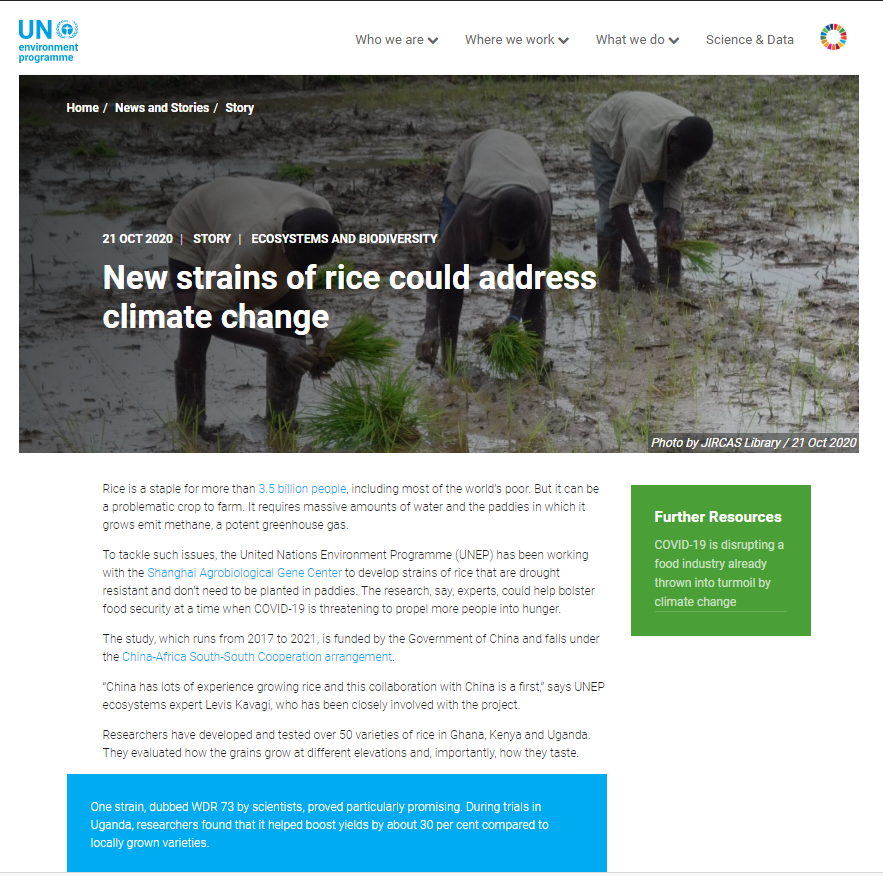
UN Environment Programme website: New rice varieties can cope with climate change
Guided by China’s principles of sincerity, real results, affinity, and good faith in Africa policy and a commitment to shared benefits, the Shanghai Agrobiological Gene Center is advancing water-saving and drought-resistant rice cooperation to new heights. In June 2023, Uganda hosted a five-day training and field demonstration for WDR (Water-Saving and Drought-Resistant Rice) technology, attended by over 150 agricultural officials and farmers from 30 districts, fostering practical knowledge exchange. Between June and July 2023, the center exchanged visits with Botswana’s Ministry of Agriculture and research institutions, signing agreements with the University of Botswana, the National Agricultural Research and Development Institute, and African Agricultural Ltd. to bolster food security through this innovation.
By mid-2024, three water-saving and drought-resistant rice varieties had been approved in three African nations, with multiple strains undergoing trials across the continent.
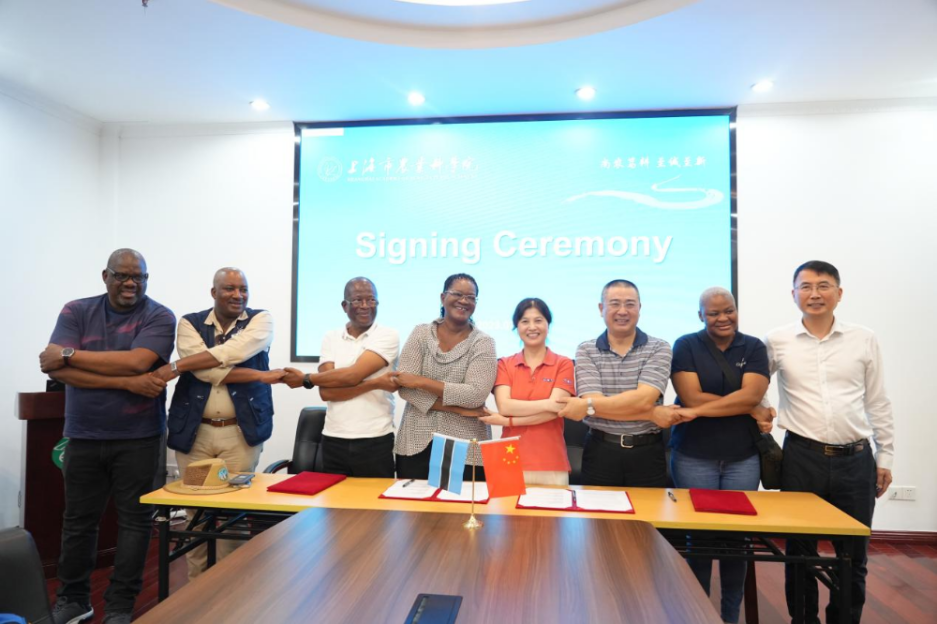
Shanghai Agrobiological Gene Center signed cooperation agreement with Botswana (2023)
This collaboration exemplifies China-Africa agricultural modernization efforts and reflects the genuine friendship and joint development between China and African nations. As a practical step to elevate China-Africa agricultural cooperation, water-saving and drought-resistant rice will continue to contribute to shared prosperity and a new era of agricultural advancement.
